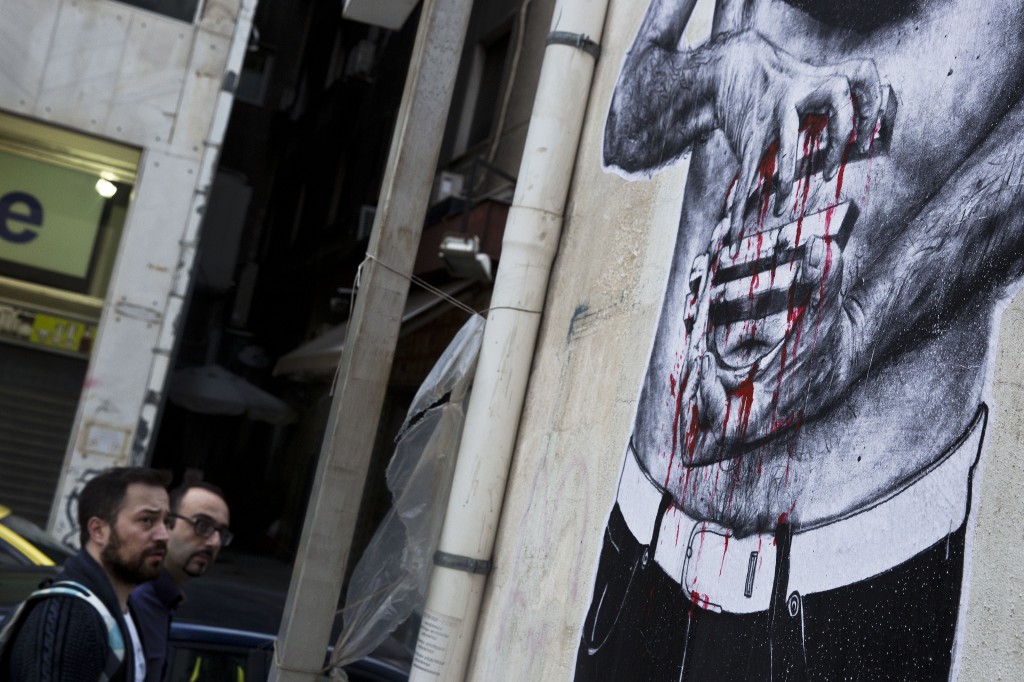Greece on the brink after Europe refuses bailout

Pedestrians look at a mural, partially seen, with hands squeezing a bleeding Euro sign in Athens, on Saturday, June 27, 2015. Greece’s place in the euro currency bloc looked increasingly shaky on Saturday after eurozone nations rejected a month-long extension to its bailout program and the prime minister called for a risky popular vote on the country’s financial future. AP
BRUSSELS, Belgium – Greece hurtled closer to the catastrophic possibility of a euro exit Saturday after Europe responded to the government’s call for a referendum by refusing to extend Athens’s desperately needed bailout.
The most dramatic day in the five-month crisis saw long lines of people queueing at cash machines in Greece in fear of capital controls as Athens looked certain to default on a huge IMF payment on Tuesday.
The European Central Bank is set to meet on Sunday amid fears Greece’s banks will be unable to open on Monday, while Germany said the Eurozone would do “everything” to protect contagion through the single currency.
Leftist Prime Minister Alexis Tsipras announced the referendum on bailout proposals by Greece’s creditors via a televised speech in the small hours of Saturday, saying he had rejected a debt deal because it involved further austerity measures that would cause “humiliation” to the Greek people.
Angry Eurozone finance ministers accused Greece of “unilaterally” breaking off talks and said they would not extend Greece’s bailout past June 30, the same day a 1.5 billion euro payment to the International Monetary Fund falls due.
“It was not us who walked away from the talks, it was the Greek government that walked away,” a grim-faced Euro group president Jeroen Dijsselbloem said after tense talks in Brussels.
But he added: “Our door is always open.”
The Greek parliament was to vote on whether to go ahead with the referendum at midnight (2100 GMT Saturday), after an address by Tsipras.
READ MORE: ‘Greece remains in the euro’ >>
Germany and France swiftly insisted that Greece would remain inside the 19-country Eurozone, with European capitals increasingly nervous that the once “irreversible” single currency is itself at risk.
“Greece remains a member of the Eurozone and Greece remains part of Europe,” said Germany’s powerful Finance Minister Wolfgang Schaeuble.
His French counterpart Michel Sapin said that Greece’s “destiny” was in the euro.
But with fears that the crisis could spread, the ministers later met without Greece to discuss the “consequences” and to insist they would “preserve the integrity and stability of the euro area” Dijsselbloem said.
“We will do everything to fight against any possible danger of contagion,” added Schaeuble in an attempt to calm global markets before they reopen on Monday.
Frozen out of the talks, Greek Finance Minister Yanis Varoufakis left saying: “It’s a sad day for Europe but we will overcome it.”
But he added that the refusal to grant his request to extend the bailout “will certainly damage the credibility for the Euro group as a democratic union and I am very much afraid the damage will be permanent.”
Greece’s negotiations with its international creditors that have dragged on since January, when Tsipras’s Syriza party first took power on a promise of ending austerity after two EU-IMF bailout programs since 2010, worth 240 billion euros.
Syriza has repeatedly refused to make cuts to pensions and changes to the VAT system demanded by Greece’s bailout monitors: the European Commission, European Central Bank and International Monetary Fund.
A week of intensive talks in Brussels ended with Greece’s creditors on Friday offering Athens a five-month, 12-billion-euro ($13.4-billion) extension of its rescue program, on condition it committed to fresh reforms.
Greek ATM queues
In Greece, queues built up at cash machines in Athens as fears mounted that the banks would not open on Monday and the government could impose capital controls to stop more deposits fleeing the country.
ATMs in the Greek parliament ran dry while in Greece’s second city, Thessaloniki, some banks have run out of money, according to an AFP reporter.
“I have a shop. I came to the bank to withdraw as much money as I can in order to cover the needs of my shop for next week,” 42-year-old Maria Kalpakidou told AFP.
Demand at petrol stations was also said to have “heightened” but there were no fuel shortage problems, according to state news agency ANA.
The European Central Bank will now play a crucial role in ensuring Greece’s banks have the cash to open at the beginning of next week, as with the end of the bailout programme Greece leaves behind billions of euros in profits on its government bonds.
Two top Tsipras aides met ECB head Mario Draghi in Brussels on Saturday.
The governing council of the ECB was also reported to be meeting on Sunday, and was “closely monitoring developments”, the bank said.
Greece was stunned by the referendum announcement by radical leader Tsipras, which came just hours after he had been at a summit with European leaders in a bid to end the crisis.
“The people must decide free of any blackmail,” the 40-year-old prime minister said in a televised address to the nation late on Friday.
“We were asked to implement austerity measures… allowing the deregulation of the labour market, pension cuts, and an increase in VAT on food products, targeting the humiliation of an entire people,” Tsipras said in his address.














